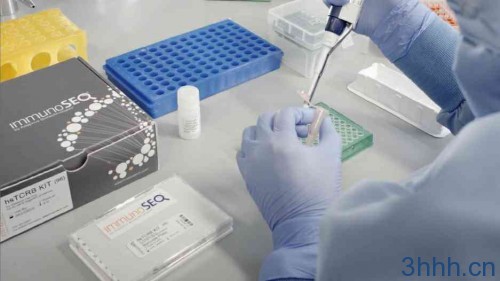|
论坛版主

|
Microsoft and Adaptive Biotechnologies announce partnership using AI to decode immune system; diagnose, treat disease
Jan 4, 2018 | Peter Lee - Corporate Vice President, Microsoft AI + Research Click to share on Facebook (Opens in new window) Click to share on Twitter (Opens in new window) 10K+Click to share on LinkedIn (Opens in new window)10K+  The human immune system is an astonishing diagnostic system, continuously adapting itself to detect any signal of disease in the body. Essentially, the state of the immune system tells a story about virtually everything affecting a person’s health. It may sound like science fiction, but what if we could “read” this story? Our scientific understanding of human health would be fundamentally advanced. And more importantly, this would provide a foundation for a new generation of precise medical diagnostic and treatment options. Peter Lee, Corporate Vice President of AI + Research (Photo by Scott Eklund/Red Box Pictures) Amazingly, this isn’t just science fiction, but can be science fact. And so we’re excited to announce a new partnership with Seattle-basedAdaptive Biotechnologies, coupling the latest advances in AI and machine learning with recent breakthroughs in biotechnology to build a practical technology for mapping and decoding the human immune system. Together, we have a goal that is simple to state but also incredibly ambitious: create a universal blood test that reads a person’s immune system to detect a wide variety of diseases including infections, cancers and autoimmune disorders in their earliest stage, when they can be most effectively diagnosed and treated. We believe deeply in the potential for this partnership with Adaptive and have made a substantial financial investment in the company. We have also begun a major research and development collaboration that involves Adaptive’s scientists working closely with our top researchers to use Adaptive’s innovative sequencing technology and Microsoft’s large-scale machine learning and cloud computing capabilities to make deep reading of the immune system a reality. Adaptive CEO and co-founder Chad Robins said in a press release today this announcement comes at a time of inflection in healthcare and biotechnology, as we now have the technology to be able to map the immune system. The potential to help clinicians and researchers connect the dots and understand the relationship between disease states could eventually lead to a better understanding of overall human health. Imagine a world with an “X-ray of the immune system.” This would open new doors to predictive medicine, as a person’s immunological history is believed to shape their response to new pathogens and treatments in ways that are currently impossible to explore. The impact on human health of such a universal blood test that reads a person’s exposure and response to disease would be, in a word, transformational. ... We’ll share more details at the upcoming JP Morgan Healthcare Conference in San Francisco, including a fireside chat at 5 p.m. PT on Wednesday, Jan. 10 with Chad Robins and myself called “Decoding the Human Immune System: A Closer Look at a Landmark Partnership.” Tags: AI, biotechnology, Health, Machine Learning https://blogs.microsoft.com/blog/2018/01/04/microsoft-adaptive-biotechnologies-announce-partnership-using-ai-decode-immune-system-diagnose-treat-disease/ |
|
论坛版主

|
沙发#
发布于:2018-01-05 23:32

The immune system’s response to the presence of disease is expressed in the genetics of special cells, called T-cells and B-cells, which form the distributed command and control for the adaptive immune system. Each T-cell has a corresponding surface protein called a T-cell receptor (TCR), which has a genetic code that targets a specific signal of disease, or an antigen. Mapping TCRs to antigens is a massive challenge, requiring very deep AI technology and machine learning capabilities coupled with emerging research and techniques in computational biology applied to genomics and immunosequencing. A challenge of this nature hasn’t been solved before, but with the collective team we’ve formed with Adaptive, we believe we have the experience, technical capability and tenacity to deliver. The result would provide a true breakthrough – a detailed insight into what the immune system is doing. Put simply, sequencing the immune system can reveal what diseases the body currently is fighting or has ever fought. A blood sample, therefore, contains the key information needed to read what the immune system is currently detecting. The basis of this approach is to develop a universal T-cell receptor/antigen map – a model of T-cell receptor sequences and the codes of the antigens they have fought. This universal map of the immune system will enable earlier and more accurate diagnosis of disease and eventually lead to a better understanding of overall human health. Microsoft and Adaptive expect this universal map to be the key for the research and development of simple blood-based diagnostics that are broadly accessible to people around the world. We’re incredibly excited to collaborate on this project with our partners at Adaptive, who have developed unique immunosequencing capabilities and immune system knowledge, along with very large data sets of TCR sequences. Classifying and mapping this data represents a large-scale machine learning project for which we’ll lean heavily on Microsoft’s cloud computing capabilities and our elite research teams. We know this partnership and the resulting work represent a big challenge. But we believe in the impact technology can have in healthcare, specifically how AI, the cloud and collaboration with our partners can come together and transform what is possible. This project is a cornerstone of our Healthcare NExT initiative, with a goal to empower innovators and pair leading capabilities in life and computer sciences to dramatically accelerate the diagnosis and treatment of autoimmune disorders, cancer and infectious disease. At Microsoft, we believe that AI and the cloud have the power to transform healthcare – improving outcomes, providing better access and lowering costs. The Microsoft Healthcare NExT initiative was launched last year to maximize the ability of artificial intelligence and cloud computing to accelerate innovation in the healthcare industry, advance science through technology and turn the lifesaving potential of next discoveries into reality. |


 一键同布到我集网·各家微博
一键同布到我集网·各家微博